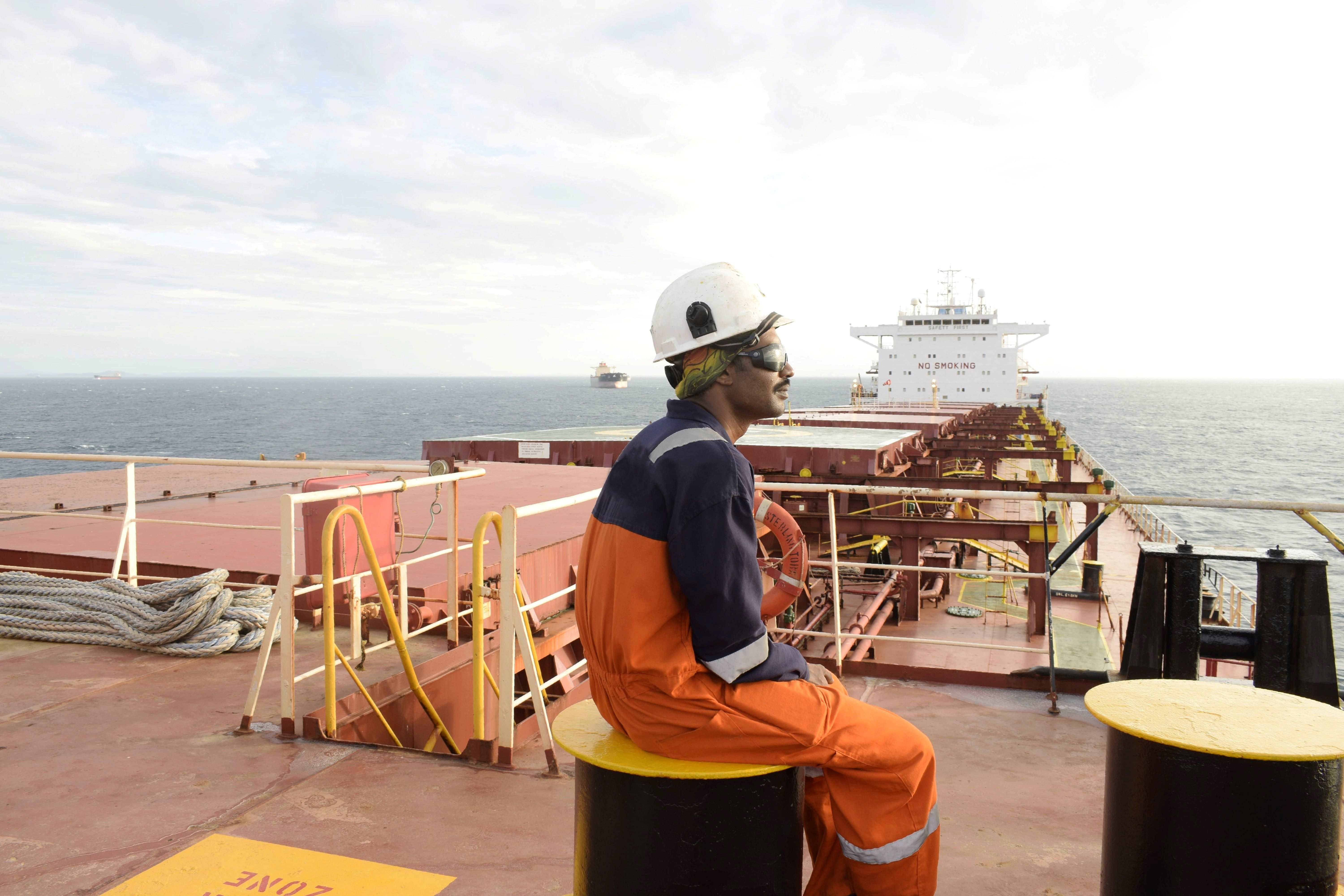COVID-19: A year on
Shipping has proven resilient through the pandemic but challenges of crew change and vaccine passports continue

It has been more than a year since the World Health Organization (WHO) declared COVID-19 a global pandemic. Most countries have endured multiple national lockdowns, while international travel restrictions continue to change on a weekly basis.
This has created an unparalleled crew change crisis for the shipping industry. At its peak 400,000 seafarers were left working on board vessels over their contracts with no way to get home, with a similar figure unable to join ships. Latest ICS analysis suggests that 200,000 seafarers continue to be affected, but this could rise if new variants force further border closures.
Shipping has responded with hitherto unforeseen level of collaboration to keep ships moving, and to lobby governments to recognise seafarers as keyworkers to ensure crew changes can occur. These efforts continue while new travel bans arise and vaccine passports loom.
Initial steps
ICS Secretary General Guy Platten recalls the events of early 2020, as lockdowns began and panic grew in the industry: “We moved quickly to get people talking and setting up regular weekly, or twice weekly, with members, social and welfare partners such as the ITF, the IMO and ILO as well as with other UN agencies and the EU. Getting everyone connected and talking was a big win as you could then rationalise the problem.”
ICS issued its first COVID-19 guidance to ship owners on 28 January 2020. In February, Guy Platten led a delegation of industry leaders to meet with the World Health Organization (WHO) in Geneva to collaborate on best practices for managing health threats onboard ships.
Out of that meeting came the first Coronavirus (COVID-19) guidance for the shipping industry, produced in collaboration with international bodies; WHO, IMO, ECDC, and IMHA. It included a raft of advice on managing port entry restrictions, and practical protective measures for seafarers. Guidance has been updated as more has become known about COVID-19. The latest version can be found here.
Crew change crisis

Despite massive pressures crew have kept global supply chains moving; essential PPE, medical supplies, and food to keep the supermarkets stocked has been delivered while countries came to an effective standstill.
ICS and the ITF wrote to UN agencies alerting them to the crew change crisis on 19 March and ICS and IAPH also highlighted the issue to G20 on 24 March.
Stephen Cotton, General Secretary of the International Transport Workers’ Federation (ITF), said that the pandemic highlighted the global nature of the shipping industry and the dependence of labour from the developing world, which came under massive pressure.
“The pandemic also revealed the resilience and pragmatism of the industry despite the collapse of world order,” he said. “However, the victims are the seafarer who have not been able to get off the ship, sometimes for more than 12 months. Many have not received medical attention and many more have had no shore leave. It truly is a humanitarian disaster.”
ICS brought together members of the shipping industry to ensure crew changes could occur at regular group meetings, including a Coronavirus Strategy and Welfare Group, a Crew Change Taskforce and a fortnightly call with the ILO Special Tripartite Committee of the MLC officers group. ICS also worked with the International Civil Aviation Organization’s (ICAO) Collaborative Arrangement for the Prevention and Management of Public Health Events in Civil Aviation (CAPSCA) on crew change challenges and with the WHO and other UN agencies to push forward work to harmonise policies, testing, and certification.
Such collaboration has helped to produce guidance for the industry and governments. On 6 May the International Maritime Organization issued a 12-step plan to 174 member states, providing them with a roadmap to free seafarers from their COVID-19 lockdown and allow appropriate exemptions for them to join or leave ships. The latest version can be found here.
Natalie Shaw, Director of Employment Affairs, ICS, said, “What we’ve managed to do is keep ships going. All this success has often been achieved through quiet negotiation. Despite every obstacle that has been thrown at us shipping, and importantly, seafarers, have continued. This has been at great cost for crew.”
To raise public awareness of seafarers’ crew change plight, ICS orchestrated a Heroes at Sea shoutout on 1 May when ships across the world sounded their horns to mark International Workers Day/Labour Day.
Keyworker status
Due to a lack of visibility at the governmental level, shipping has had to create new avenues into governments to lobby for seafarer keyworkers status and the resolution of the crew change crisis.
Guy Platten said: “A landmark moment was the UK hosting a virtual summit on 9 July on COVID-19 and crew change that saw the attendance of 15 countries.” Of those attending, 13 countries pledged to facilitate crew changes.
The submission of Article XXII sent to the International Labour Organisation (ILO) Committee of Experts on Conventions prompted another landmark moment: a ruling from the International Labour Organisation (ILO) in December 2020 which found that governments have breached seafarers’ rights and failed to comply with several provisions of the Maritime Labour Convention during the COVID-19 pandemic. The UN agency called on states to recognise seafarers as key workers “without delay”. To date, 55 countries and two associate members have designated seafarers as keyworkers.
Even the UN Secretary General António Guterre and His Holiness the Pope responded to the call.
“The crew change crisis is not resolved but has reached a situation where it has been more manageable. The crisis is still ongoing so we will not let up our efforts,” Guy Platten stressed.
Stephen Cotton added: “Governments have an inability to recognise the importance of shipping on every level, from providing groceries, PPE, and soon the vaccine. Even when they want to help the machinery isn’t there. Now we have 57 countries that recognise seafarers as keyworkers. Why so few?”

Guy Platten noted industry concerns that crew changes are becoming more difficult as countries ramp up travel restrictions against the spread of new variants. Vaccine passports also pose a potential barrier to crew change as seafarers from developing nations are unlikely to have an opportunity to receive vaccines until July at the earliest.
Most countries with access to vaccines continue to prioritise frontline health workers and age groups most at risk of the virus. While Singapore has become one of the first countries to prioritise maritime workers for the jab, starting with port workers, many major seafarer supply countries’ access to vaccines is limited and will depend upon support from the COVAX programme. ICS calculates that 900,000 of the world’s seafarers (well over half the global workforce) are from developing nations.
To ensure that seafarers are well informed of the vaccine options that are available to them, and to counteract misinformation and rumours about vaccines, the ITF, International Maritime Health Association (IMHA) ICS and Intertanko are launching a practical guide, Vaccination for Seafarers and Shipping, on 24 March.
Efforts are continuing within the industry to ensure seafarers will be safely vaccinated and not put at the back of the queue. Guy Platten said: “Governments will not be able to vaccinate their citizens without the shipping industry or, most importantly, our seafarers.”
Lessons learnt
Important inroads with governments and across the maritime supply chain have been made to help resolve individual crew change cases. Platten noted these contacts will stand the industry in good stead for tackling the challenges of decarbonisation and climate change.
Stephen Cotton and Fred Kenney, Director, Legal and External Affairs, IMO, both also stressed the need for the unprecedented levels of collaboration within the shipping industry to carry on. Stephen Cotton said, “Let’s continue to break problems into bitesize challenges and pull on the different skills at the table, recognising that we won’t agree about everything and with mutual respect of everyone’s responsibilities to their own members.”
Fred Kenney, echoed this sentiment: “When we are through the pandemic and resolve the crew change crisis, we will still be faced with the challenge of reduction of GHG emissions and decarbonisation of the industry, improving safety and looking at a work force needed to operate the ships of the future. This will require the same level of cooperation and coordination.”
Related content

Elpi Petraki: Progress for all

Seafarer wellbeing under threat amid geopolitical conflict

Collective voice needed to deliver effective AI standards
